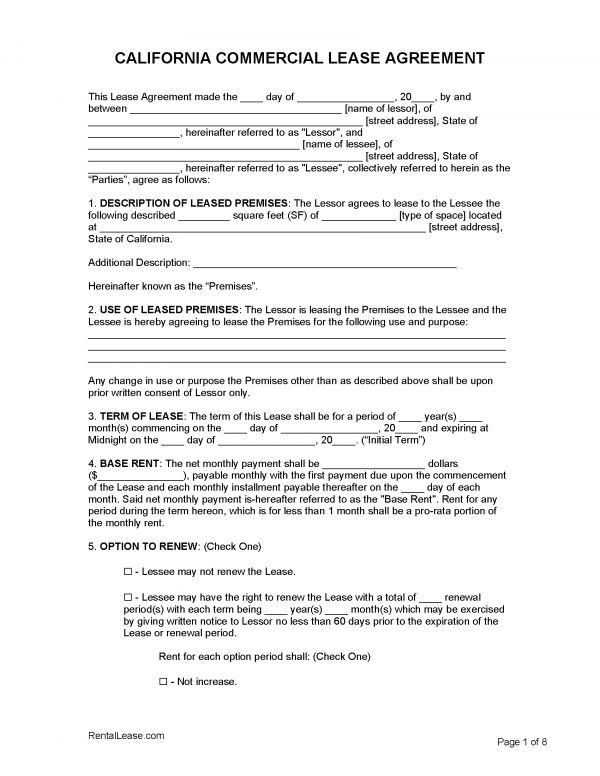

The California commercial lease agreement is a document used to lease a property to a tenant requiring retail, office, or industrial space. Often a landlord will not see rent payments until the business in question has begun generating sufficient income. For this reason, it is wise of the landlord to research the business prior to drafting a lease agreement. In general, there are three types of commercial lease agreements used when entering into a landlord-tenant relationship; each has been described below.
Gross – The preferred situation for the tenant, as the tenant is only required to pay a monthly fee, and all other maintenance and tax bills including repairs are taken care of by the landlord.
Modified Gross – This agreement is in-between Gross and Triple Net (NNN), as the landlord and tenant will divide the costs amongst them. Simply put, both the tenant and landlord will share a part of the maintenance and tax costs.
Triple Net (NNN) – The best situation for the landlord, as the tenant is responsible for paying all maintenance, tax, utility, and repair costs to the property.
Arbitration of Disputes (BPC 7191) – The following statement must be included and typed in 8-point roman boldface type and capitalized, if and when arbitration is mentioned in the agreement:
“NOTICE: BY INITIALING IN THE SPACE BELOW YOU ARE AGREEING TO HAVE ANY DISPUTE ARISING OUT OF THE MATTERS INCLUDED IN THE ‘ARBITRATION OF DISPUTES’ PROVISION DECIDED BY NEUTRAL ARBITRATION AS PROVIDED BY CALIFORNIA LAW AND YOU ARE GIVING UP ANY RIGHTS YOU MIGHT POSSESS TO HAVE THE DISPUTE LITIGATED IN A COURT OR JURY TRIAL. BY INITIALING IN THE SPACE BELOW YOU ARE GIVING UP YOUR JUDICIAL RIGHTS TO DISCOVERY AND APPEAL, UNLESS THOSE RIGHTS ARE SPECIFICALLY INCLUDED IN THE ‘ARBITRATION OF DISPUTES’ PROVISION. IF YOU REFUSE TO SUBMIT TO ARBITRATION AFTER AGREEING TO THIS PROVISION, YOU MAY BE COMPELLED TO ARBITRATE UNDER THE AUTHORITY OF THE BUSINESS AND PROFESSIONS CODE OR OTHER APPLICABLE LAWS. YOUR AGREEMENT TO THIS ARBITRATION PROVISION IS VOLUNTARY.” “WE HAVE READ AND UNDERSTAND THE FOREGOING AND AGREE TO SUBMIT DISPUTES ARISING OUT OF THE MATTERS INCLUDED IN THE ‘ARBITRATION OF DISPUTES’ PROVISION TO NEUTRAL ARBITRATION.”
CASp Report (CIV 55.53) – Certified Access Specialist (CASp) Reports must be given to the new tenant(s), and a report may be requested by said tenant up to forty-eight (48) hours prior to signing the lease.
If no CASp Report is issued, the following statement must be entered into the lease agreement:
“A Certified Access Specialist (CASp) can inspect the subject premises and determine whether the subject premises comply with all of the applicable construction-related accessibility standards under state law. Although state law does not require a CASp inspection of the subject premises, the commercial property owner or lessor may not prohibit the lessee or tenant from obtaining a CASp inspection of the subject premises for the occupancy or potential occupancy of the lessee or tenant, if requested by the lessee or tenant. The parties shall mutually agree on the arrangements for the time and manner of the CASp inspection, the payment of the fee for the CASp inspection, and the cost of making any repairs necessary to correct violations of construction-related accessibility standards within the premises.”
Repairs (CIV 1938) – The landlord shall be held responsible for maintaining the property, UNLESS the landlord and tenant come to a separate agreement.

Standard Version
First Tuesday Version